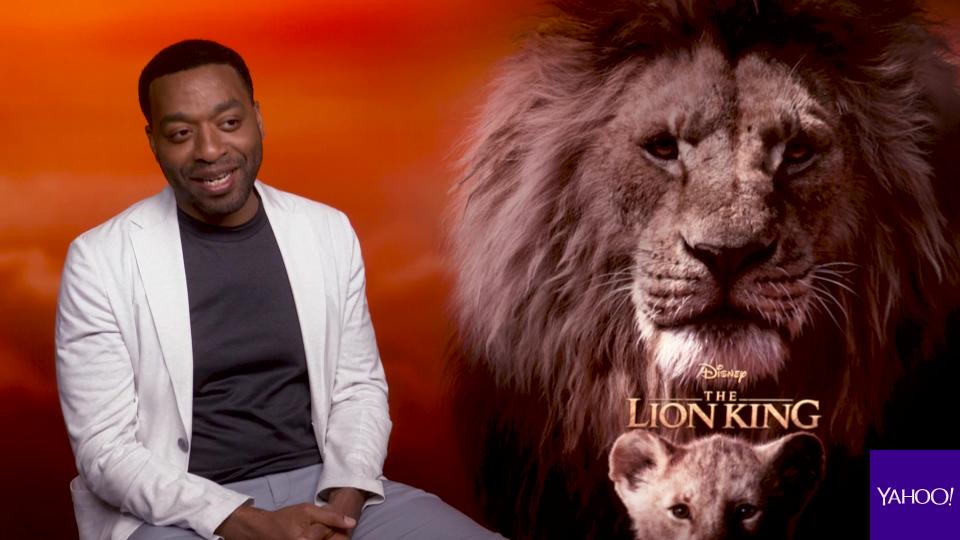Chiwetel Ejiofor and Jon Favreau talk Scar and why James Earl Jones was the only returning 'Lion King' star (exclusive)
When the voice cast for The Lion King remake was announced it wasn’t a shock to see that James Earl Jones had been asked to reprise his role as Mufasa.
The celebrated actor, who had also lent his voice to the iconic Star Wars villain Darth Vader, made the ruler of the Pridelands very much his own and director Jon Favreau would’ve been hard pushed to find a worthy replacement.
Still, the animated features was made in 1994, 25 years before the remake’s scheduled release, and plenty of the original voice cast were, and are, still alive including Jeremy Irons
Irons’ performance as Scar, Mufasa’s Machiavellian brother, is iconic and some might say irreplaceable so why was Jones the only one asked to reprise his role?
“I felt that The Lion King was very different from The Jungle Book, you can't just make your own story up,” Favreau explains to Yahoo Movies UK. “It means too much to people who grew up with it and we wanted to stay true so where did you find the differentiation?

“I knew the technology would allow me to differentiate from the cartoon and as we were 25 years later it was an opportunity to have a whole new cast to interpret the roles,” the director continues. “With James Earl Jones, because Mufasa's character only lasts for the beginning of the film - and he's so iconic and so hard to replace - it felt like there was a way to hand off to the next generation, it felt like that was the right balance.”
Read more: The legal row behind ‘The Lion Sleeps Tonight’
Though this next generation of voice actors share a lot of similarities with the original: Timon and Pumbaa once again bring the chutzpah, Zazu is back barking orders in a clipped British accent and Scar still has the voice of a posh stage actor.
“I felt that there was a Shakespearean aspect to [Scar[ that we wanted to embrace and to keep it similar enough as the stage play did to the film,” Favreau says.

“We wanted to make it echo from the original so having John Oliver instead of Rowan Atkinson, same with Seth Rogen and Billy Eichner, but with Chiwetel [Ejifor] that was the toughest role in the film because if you were going to cast anybody else after James Earl Jones you'd immediately go to Jeremy Irons.”
Read more: Jon Favreau on the struggle to make The Lion King remake
Ejifor knows the veteran actor but hadn’t spoken to him after getting cast as Scar. “I'm sure he would have been okay with me calling him up,” the actor says, “but that didn't happen.”
Instead, he and his director focused on how they would embrace the realism of the new visual style in order to create their own interpretation of the villain.
“I didn't really have a conversation with Jon Favreau about what accent to use,” Ejiofor explains. “The process was more that I was going to work on the psychology of Scar [and] the reasons why he does the things he does.

“My interest was in the grounding of Scar and just sitting in within the kind of realism for what it was going to look like and so just coming at it from that angle.”
Favreau said that after hearing Irons’ voice work over scenes from the new movie they knew that the tone wouldn’t have fit with this vision.
“Tonally, we'd done this, we've listened to the audio from the original with our imagery sometimes to see how we're lining up,” the director says. “And actually it felt like we were breaking the tone we were going for.
“So we wanted somebody who would find a different tone who could bring some subtlety and dimension. Even with ‘Be Prepared,’ Tim Rice rewrote new lyrics and Hans [Zimmer] recomposed it.”

Scar’s solo is very different to the original though Ejifor, like Irons, performs it though the actor admits he’s not on the same level of proficiency as some of the other people in the case.
“I wouldn't call myself much of a singer, Beyonce is also on the soundtrack,” Ejifor chuckles. “I was just very excited about the arrangement because it just sat within the context of what we were doing.
“That sort of realism and grounding that character in something that was very intense and again broken and slightly beaten and this being his one rallying cry,” he continues, “it's the most important moment of his life.
“It's the bit that's going to set the world back into what he considers to be the correct order with him on top.”
The realism of Scar’s struggle and warped head space was reflected in his look; while the original film made him look like he cared a lot about his appearance this photorealistic version was far less forgiving.
“When I started it was just text and then when I came back a little while later and it was some drawings,” Ejifor says of the recording his role as the design of Scar evolved. “Then [I'd] come back and there was some animation and then the fuller rendering and so on.
“I think they had an idea of Scar but it was adjusting as things go along,” he explains, that idea of him being kind of weathered, beaten up and diseased, in a way, by his mind and tortured.”
So how does the actor feel about continuing the Hollywood tradition of making villains British?
“There is something sort of mellifluous about it,” Ejiofor says, “so then the kind of villainy can slide out a little.”
The Lion King is in cinemas on Friday.

 Yahoo Movies
Yahoo Movies 
